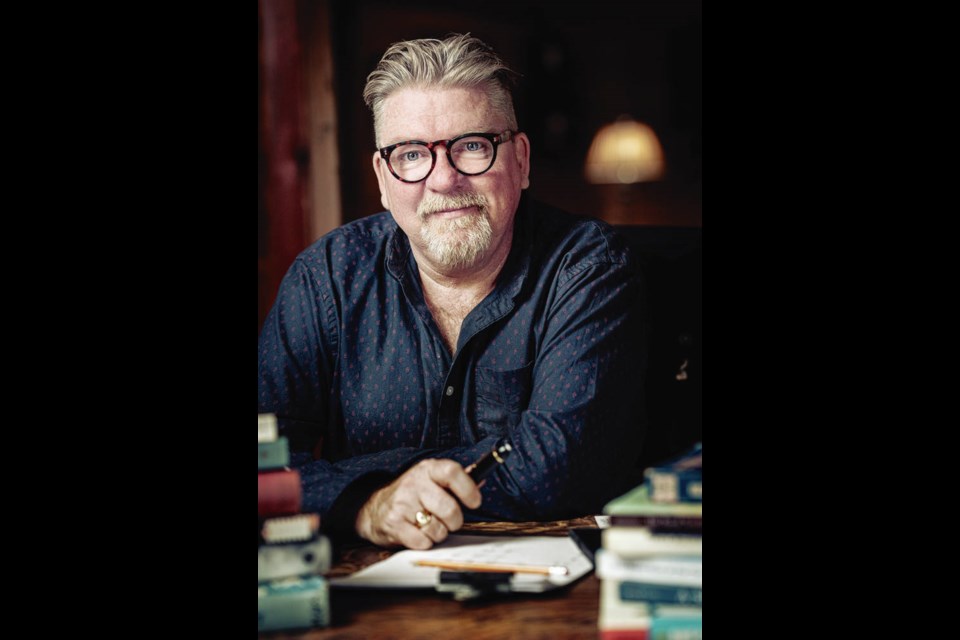The transition from musician to author wasn’t a difficult one for Vince Ditrich, whose artistic pursuits have always run the gamut.
“I’ve always been writing — not seriously, but constantly,” said Ditrich, 58, who spent 30 years behind the drum kit with Vancouver folk-rockers Spirit of the West. “It was always something I wanted to do. It’s a massive bucket-list accomplishment.”
Ditrich, who lives in Nanoose Bay, crossed “published author” off his wish list with The Liquor Vicar, his debut novel. The book follows the exploits of hopeful musician Tony Vicar, who never quite made it in the business but becomes something of a celebrity after saving a woman from a near-fatal car accident.
Ditrich wrote it over a period of four years, and drew upon personal experience in spots. He took liberties — such as calling a Vancouver rock group, Old Man Smell, and naming a Seattle act Marrakesh Espresso — to protect the innocent. “There are threads of things that happened to me 40 years ago in there,” Ditrich said.
The book takes place in the fictional town of Tyee Lagoon but is set on Vancouver Island, one of many real-life remnants scattered throughout the book. Vicar is equal parts anti-hero and saviour, identifiable character traits of many musicians he’s met, Ditrich said with a laugh.
“Little quips and little quotations, and bad hairdos from the 1980s, all these things I’ve kept in my mental scrapbook. I bust all of these things into shards and reassemble them into this book mosaic.”
He loved working on the book with editors and confidants, which helped him find his voice as a writer. But writing is an oddly isolating experience, Ditrich said, especially when compared to his time with Spirit of the West, who favoured a democratic approach.
Even-keel notwithstanding, Spirit of the West was led by two strong-willed frontmen, Geoffrey Kelly and the late John Mann, which meant Ditrich often could only watch in awe — even though he was the group’s manager, and moonlighted as the writer behind the majority of the band’s promotional material.
In writing the book, Ditrich felt “an incredible sense of delight and cosiness, because it was all me,” he said. “I made all the decisions, I didn’t have to say, ‘What do you think, guys?’ There was no asking permission to abandon things and circle back to them later. It was liberating.”
The journey to bring The Liquor Vicar to life wasn’t without its struggles. Ditrich began working on the book in 2016, around the time Spirit of the West came to an end, but news of a matching kidney donor (Ditrich had been battling health issues for years) led to a kidney transplant three months afterward. He took a year off to recuperate.
“I was next to dead,” Ditrich said.
Writing became his therapy. He looked to several friends for guidance along the way, including filmmaker and author Pete McCormack (Facing Ali), who filmed the band’s 2015 performance at Massey Hall in Toronto, one of their last with Mann, for the acclaimed documentary, Spirit Unforgettable. It was McCormack who suggested that The Liquor Vicar be written in a way that it could be easily adapted to TV, according to Ditrich.
He signed a three-book deal with Toronto’s Dundurn imprint, the second of which is already written and slated for release next year, which explains why the cautionary tale comes to a close on a foreboding, open-ended note. Tony Vicar will be here to stay, for the immediate future, Ditrich said.
“The whole goal behind this is to have a world that becomes really appealing to people and have them buy in.”
Which begs the question: How much of Vince is in Vicar? He was always the wildcard in Spirit of the West, one who often eschewed pants during performance and was fond of singing the occasional Dean Martin in concert.
Perhaps it is a question that needs no answer. “I have one of those personalities,” Ditrich said. “It’s not an act I’m putting on. I’m a very valuable person to have at a stiff party.”


-thumb.png;w=120;h=80;mode=crop)
